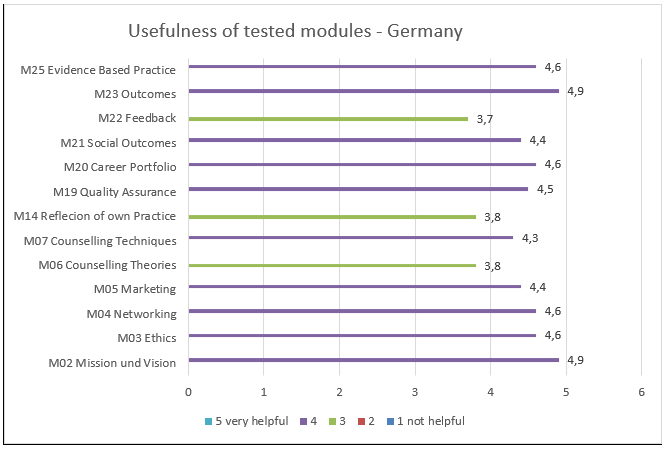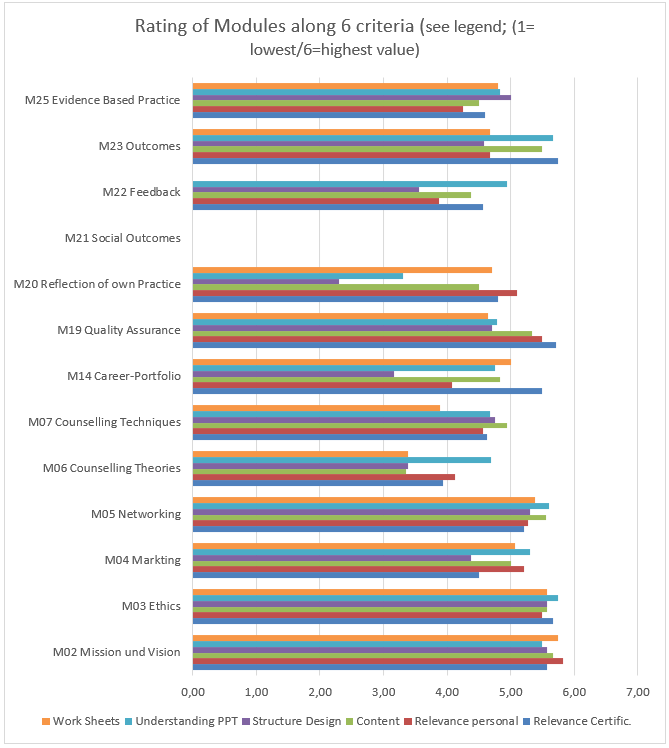The mentoring programme developed for practitioners – candidates for certification was tested in April in Germany. The testing phase was organized by the National Guidance Forum (nfb) in cooperation with the IMBSE-GmbH (Institute for Models of vocational and social development – nfb member and partner) on their premises in Krefeld, a middle-sized town in Northrhine-Westfalia. The testing was carried out with 13 participants (9 participants from IMBSE, 3 participants from dvb, 1 Participant from NOLOC) plus 4 trainers from IMBSE and nfb.
The selection of modules presented in the testing of the mentoring Programme was subject to several discussions and decisions between nfb and the Slovakian and Czech partners during the partner meeting in s’Hertogenbosch and also between nfb and our training provider IMBSE. From the 22 modules available we chose 13 modules but combined some of them into one training unit.
Most of the presentations and works sheets were translated into German beforehand which very turned out to be very helpful for the testing. All the presentations, work sheets and some photo-protocols will be uploaded on the IMBSE Website in a special cloud so that all participants can download them if they want, but also on the google drive platform of the Qual-IM-G project.
The data from feedback questionnaires show that the modules
- Mission and Vision
- Ethics
- Outcomes
- Evidence Based Practice
- Networking
- Career Portfolio
got the highest agreement in terms of being useful for a preparation for certification whereas theory, counselling techniques and reflection of own practice were felt not to be significantly important for this specific purpose. However, the participants indicated in one of our open questions that for their own benefit they would have appreciated to work more intensively on these modules.

A more detailed analysis shows that the highest standard deviation in results between the different evaluation criteria can be observed in the modules Reflection of Own Practice, Career Portfolio and Counselling Theory. The work sheets used for practical self or group work and the following plenary discussions were mostly appreciated although we mostly ran out of time. Some ore detailed feedback to some of the modules and the presentation of content can be found in the qualitative statements of the participants.

Summarizing the quantitative and qualitative results and feedbacks from the participants the workshop and the testing of the Mentoring Programme in Germany was very successful and of great value for the participants. During the whole workshop the participants actively participated in the programme as a whole as well as in the group work and the plenary discussions. The overall feedback however was, that there was not enough time in most modules.
For the final decision in the project how many and which modules should be selected for the final version of the Mentoring Programme, our recommendation is that with regard to the overall goal of the Mentoring Programme the following modules (from the modules tested in our testing phase) definitely should be part of the final programme:
- M02 Mission and Vision
- M03 Ethics
- M04 Marketing
- M05 Networking
- M14 Career Portfolio
- M19 Quality Assurance
- M 23 Outcomes
- M25 Evidence Based Practice
This of course has to be subject to further discussion among the partner organizations in the project.

